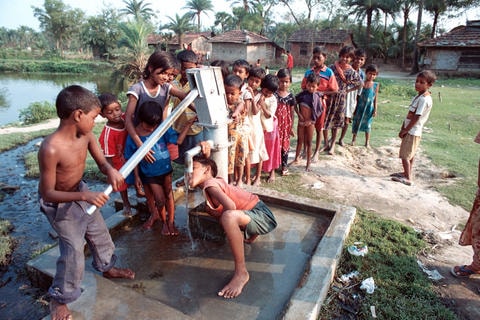Vision & mission
Giving an audible voice to water

The World Water Council is a network: a network of wide-ranging competencies distributed the world over. Working towards the future of water does not boil down to being a substitute for the capacities of this network. On the contrary, it seeks to amplify its actions and make the most of them to create new synergies and propose innovative solutions.
World Water Council Strategy 2012-2015
Profile and mission
The World Water Council is an international multi-stakeholder platform. It was established in 1996 on the initiative of renowned water specialists and international organisations, in response to an increasing concern about world water issues from the global community.
The World Water Council's mission is to promote awareness, build political commitment and trigger action on critical water issues at all levels, including the highest decision-making level, to facilitate the efficient conservation, protection, development, planning, management and use of water in all its dimensions on an environmentally sustainable basis for the benefit of all life on earth.
By providing a platform to encourage debates and exchanges of experience, the Council aims to reach a common strategic vision on water resources and water services management amongst all stakeholders in the water community. In the process, the Council also catalyses initiatives and activities, whose results converge toward its flagship product, the World Water Forum.
Our values
The World Water Council is committed to a set of values that contributes to achieving the goals we pursue. These are:
- Transparency: The network is open to anyone organisation that subscribes to its objectives and information flows freely between its members;
- Democracy: The network is founded on democratic principles, one member one vote; opinions of all members are distributed freely around the network;
- Dignity: Discussions are held in a dignified manner, everyone gets a chance to be heard when everyone gets a chance to listen;
- Independence: No special interests should interfere in bringing issues to the table when such issues are relevant to water;
- Participation: It is believed that complex issues such as water issues can only be addressed and solved by having all relevant stakeholders participate in discussions.
Strategy
The Council's action for the triennial period until 2018 is oriented in priority towards bringing people together through active hydro-diplomacy, exploring new ideas and concepts and discussing issues while encouraging exchanges and networking.
The anticipated activities are situated in 4 specific domains:
- Water on the Political Agenda
- Exploring Water Security issues
- Co-organising World Water Forums
- Reinforcing the Organisation
Through its wide membership of organisations throughout the world, the Council spreads information about the processes it carries out in leading political, scientific and technical domains, in addition to practical perspectives and knowledge. It does this through a wide range of activities overseen by the Board of Governors, including the World Water Forums, multi-stakeholder dialogues, workshops, publications and online platforms.
The Council, as an umbrella organisation, follows three working principles:
- It restricts itself to policy-related issues and addresses other issues only if they are cross-cutting or controversial;
- It plays the role of facilitator for cross-cutting programs and does not do work that could be done by its members;
- It cooperates with its members to identify the policy implications of their work and helps them to develop and promote these implications.
Financial Resources
The Council is financed primarily through membership fees and Forum licencing fees and additional support is provided by the host City of Marseille. Specific projects and programmes are financed through donations and grants from governments, international organisations and donors.
